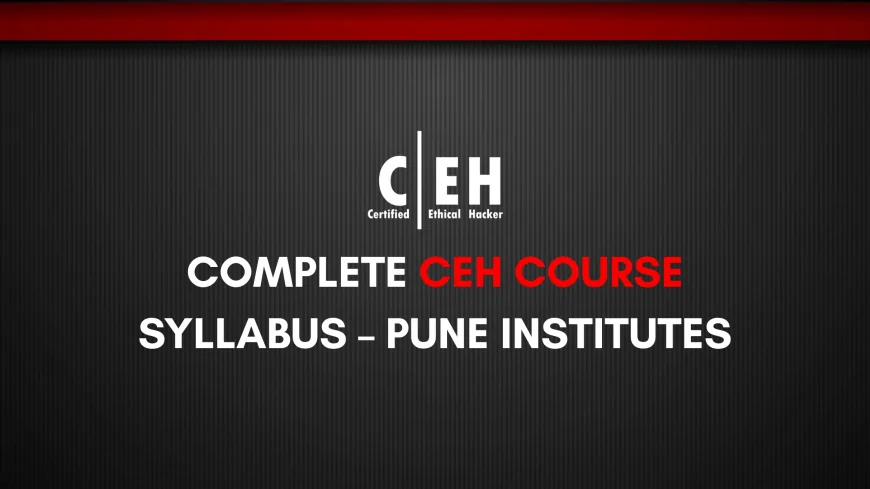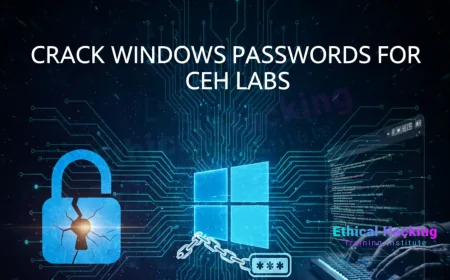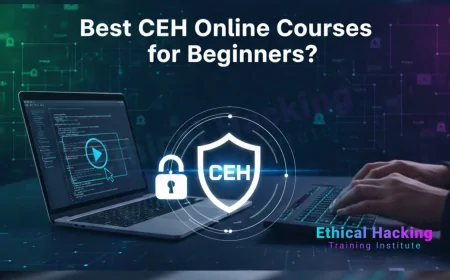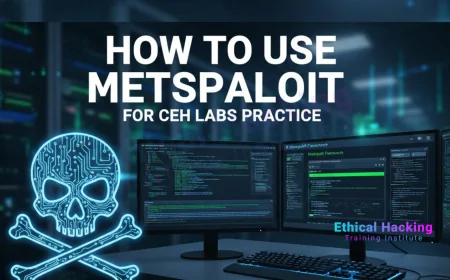Complete Ethical Hacking Course Syllabus in Pune | Learn from Experts
Discover the complete ethical hacking course syllabus offered by top institutes in Pune. Learn essential modules like system hacking, malware analysis, penetration testing, and more. Perfect for aspiring cybersecurity professionals seeking hands-on ethical hacking training and certification in Pune.

In today's digital age, cybersecurity has become paramount. With the increasing number of cyber threats, the demand for skilled ethical hackers is on the rise. Ethical hacking, also known as penetration testing or white-hat hacking, involves legally breaking into computers and devices to test an organization's defenses. This guide provides a comprehensive overview of a typical ethical hacking course syllabus, designed to equip aspiring cybersecurity professionals with the necessary skills and knowledge.
Comprehensive Ethical Hacking Course Curriculum: From Fundamentals to Career Readiness
Module 1: Introduction to Ethical Hacking
-
Overview of Ethical Hacking: Understanding the role and importance of ethical hackers in today's cybersecurity landscape.
-
Types of Hackers: Differentiating between white-hat, black-hat, and gray-hat hackers.
-
Legal Implications: Studying the laws and regulations governing ethical hacking practices.
Module 2: Networking Fundamentals
-
Network Topologies and Protocols: Learning about different network structures and communication protocols.
-
IP Addressing and Subnetting: Understanding how devices are identified and organized within a network.
-
OSI and TCP/IP Models: Exploring the layers of network communication and their functions.
Module 3: Footprinting and Reconnaissance
-
Information Gathering Techniques: Employing methods to collect data about target systems.
-
WHOIS and DNS Interrogation: Extracting domain registration and DNS information.
-
Social Engineering Tactics: Understanding how attackers manipulate individuals to gain confidential information.
Module 4: Scanning Networks
-
Port Scanning: Identifying open ports and services running on a target system.
-
Network Mapping: Creating a visual representation of the network's structure.
-
Vulnerability Scanning: Detecting weaknesses in systems that could be exploited.
Module 5: Enumeration
-
User and Group Enumeration: Gathering information about user accounts and groups.
-
Network Resource Enumeration: Identifying shared resources and services.
-
SNMP and LDAP Enumeration: Extracting data using specific protocols.
Module 6: System Hacking
-
Password Cracking Techniques: Exploring methods to recover passwords.
-
Covering Tracks: Understanding how attackers hide their activities.
Module 7: Malware Threats
-
Types of Malware: Studying viruses, worms, Trojans, and other malicious software.
-
Malware Analysis: Examining how malware operates and spreads.
-
Countermeasures: Implementing strategies to prevent and mitigate malware attacks.
Module 8: Sniffing and Spoofing
-
Packet Sniffing: Capturing and analyzing network traffic.
-
MAC and IP Spoofing: Understanding how attackers disguise their identity.
-
ARP Poisoning: Exploring techniques to intercept network communications.
Module 9: Social Engineering
-
Phishing Attacks: Recognizing and preventing deceptive attempts to acquire sensitive information.
-
Impersonation Techniques: Understanding how attackers pose as trusted individuals.
-
Defense Mechanisms: Implementing training and policies to combat social engineering.
Module 10: Denial of Service (DoS) Attacks
-
Understanding DoS and DDoS: Studying how attackers overwhelm systems to disrupt services.
-
Attack Tools and Techniques: Exploring methods used to launch DoS attacks.
-
Mitigation Strategies: Implementing measures to prevent and respond to DoS attacks.
Module 11: Session Hijacking
-
Session Management: Understanding how sessions are maintained in web applications.
-
Hijacking Techniques: Exploring methods attackers use to take over sessions.
-
Prevention Measures: Implementing security practices to protect sessions.
Module 12: Hacking Web Servers and Applications
-
Web Server Vulnerabilities: Identifying common weaknesses in web servers.
-
SQL Injection and Cross-Site Scripting (XSS): Understanding how attackers exploit web applications.
-
Secure Coding Practices: Implementing techniques to develop secure web applications.
Module 13: Wireless Network Hacking
-
Wireless Standards and Encryption: Studying Wi-Fi protocols and security measures.
-
Attacking Wireless Networks: Exploring methods to compromise wireless security.
-
Defensive Strategies: Implementing measures to secure wireless networks.
Module 14: Mobile Platform Hacking
-
Mobile Operating Systems: Understanding the security architecture of mobile platforms.
-
Mobile Threats and Vulnerabilities: Identifying risks associated with mobile devices.
-
Mobile Security Best Practices: Implementing strategies to protect mobile environments.
Module 15: Cloud Computing and IoT Security
-
Cloud Security Fundamentals: Studying the principles of securing cloud environments.
-
IoT Device Vulnerabilities: Understanding the risks associated with Internet of Things devices.
-
Security Measures: Implementing practices to secure cloud and IoT infrastructures.
Module 16: Cryptography
-
Encryption Techniques: Learning about symmetric and asymmetric encryption.
-
Hash Functions and Digital Signatures: Understanding data integrity and authentication methods.
-
Cryptographic Attacks: Exploring methods attackers use to compromise encryption.
Module 17: Penetration Testing
-
Penetration Testing Phases: Understanding the steps involved in a penetration test.
-
Tools and Methodologies: Employing various tools to conduct penetration tests.
-
Reporting and Documentation: Creating comprehensive reports detailing findings and recommendations.
Module 18: Security Policies and Compliance
-
Developing Security Policies: Creating guidelines to protect organizational assets.
-
Compliance Standards: Understanding regulations like GDPR, HIPAA, and PCI-DSS.
-
Risk Management: Identifying and mitigating potential security risks.
Module 19: Incident Response and Forensics
-
Incident Handling Procedures: Establishing protocols to respond to security incidents.
-
Digital Forensics Basics: Collecting and analyzing digital evidence.
-
Chain of Custody: Maintaining the integrity of evidence for legal proceedings.
Module 20: Career Pathways in Ethical Hacking
-
Job Roles and Responsibilities: Exploring various positions in the cybersecurity field.
-
Certifications and Further Learning: Identifying additional qualifications to enhance career prospects.
-
Industry Trends: Staying updated with the latest developments in cybersecurity.
FAQ's
1. What does the complete ethical hacking course syllabus include?
The syllabus covers network security, system penetration testing, malware analysis, vulnerability assessment, wireless security, web application hacking, social engineering, cryptography, and hands-on ethical hacking labs. It ensures students understand the full lifecycle of cybersecurity attacks and defenses.
2. Is the syllabus updated with the latest industry trends?
Yes, the course syllabus is regularly updated to reflect current cybersecurity threats, attack vectors, and ethical hacking methodologies. Training institutes in Pune often align their curriculum with global certifications like CEH and OSCP.
3. Does the syllabus cover hands-on ethical hacking projects?
Absolutely! Real-world projects and simulated hacking labs are a core part of the syllabus. These practical sessions help students build problem-solving skills and confidence in applying their knowledge in actual cybersecurity scenarios.
4. Will I learn about ethical hacking tools in the course?
Yes, the syllabus introduces industry-standard tools like Nmap, Metasploit, Wireshark, Burp Suite, John the Ripper, and more. Training institutes in Pune ensure students gain practical exposure to each tool.
5. Is Linux covered in the ethical hacking syllabus?
Linux is an essential part of the syllabus. Students are trained in Linux commands, file systems, scripting, and how to use it as a hacking environment, especially with tools like Kali Linux.
6. Does the syllabus include network security fundamentals?
Yes, strong emphasis is placed on networking basics such as TCP/IP, OSI model, protocols, firewalls, VPNs, and IDS/IPS. This foundation is critical for ethical hacking.
7. Will I learn web application security in this course?
Definitely. The syllabus includes web app hacking techniques like SQL injection, XSS, CSRF, session hijacking, and securing applications based on OWASP Top 10 vulnerabilities.
8. Are mobile application vulnerabilities part of the syllabus?
Some advanced ethical hacking courses do cover mobile app security, including Android and iOS exploitation techniques, as part of elective or specialization modules.
9. Does the syllabus prepare me for CEH certification?
Yes. Many ethical hacking institutes in Pune structure their syllabus to closely align with EC-Council’s CEH certification, ensuring you are exam-ready upon completion.
10. How long does it take to complete the full syllabus?
Typically, the full syllabus is covered in 2 to 4 months, depending on the training mode (weekday or weekend). Weekend batches are especially popular among working professionals in Pune.
11. Is cloud security covered in the ethical hacking course syllabus?
Many courses now include basics of cloud security, cloud penetration testing, and understanding threats to platforms like AWS and Azure, given the shift toward cloud infrastructure.
12. What ethical hacking techniques will I learn?
You’ll learn reconnaissance, scanning, enumeration, vulnerability exploitation, privilege escalation, maintaining access, and covering tracks – all part of the hacker’s lifecycle.
13. Is social engineering part of the syllabus?
Yes. You'll understand psychological manipulation tactics, phishing campaigns, pretexting, and real-world case studies to defend against human-based cyber attacks.
14. Will I learn about cybersecurity laws and ethics?
Yes, ethical and legal aspects of hacking are covered, including Indian IT laws, data privacy regulations, and responsible disclosure practices.
15. Are penetration testing methodologies included?
Yes. The syllabus includes manual and automated penetration testing methodologies, report writing, risk analysis, and client communication essentials.
16. Can beginners understand this syllabus?
Yes, the course starts with fundamentals, making it beginner-friendly. However, having basic computer and networking knowledge is a plus.
17. Will I get support to revise the syllabus topics later?
Most ethical hacking training institutes in Pune offer lifetime access to course materials, recorded sessions, and revision workshops for ongoing support.
18. Is ethical hacking taught with real-time scenarios?
Yes. Real-time simulated cyberattacks and case studies are a key part of the learning approach to ensure you’re job-ready upon course completion.
19. Is wireless network hacking included in the syllabus?
Yes, wireless security, including Wi-Fi cracking, WPA/WPA2 protocols, rogue access points, and packet sniffing are covered comprehensively.
20. Does the syllabus include malware analysis?
Yes, advanced courses cover basic malware behavior analysis, reverse engineering, and identifying suspicious patterns using tools and sandboxes.
21. Are assignments and quizzes part of the syllabus?
To track progress, ethical hacking institutes in Pune include regular assessments, quizzes, assignments, and mock tests in their curriculum.
22. Do I receive a certificate after completing the syllabus?
Yes, upon successfully completing the syllabus and assessments, students receive a course completion certificate from the institute.
23. Is there any placement support after completing the syllabus?
Many ethical hacking training institutes in Pune offer placement assistance, resume preparation, interview coaching, and access to cybersecurity job openings.
24. Does the syllabus include any soft skills training?
Some institutes integrate soft skills, communication, and interview preparation modules to help students present their technical skills effectively.
25. How does the syllabus prepare me for cybersecurity roles?
The syllabus ensures you're ready for roles like Ethical Hacker, Penetration Tester, SOC Analyst, and Security Consultant by focusing on practical, job-aligned skills.
Your Path to Becoming a Certified Ethical Hacker
Embarking on a journey in ethical hacking requires a solid foundation in various cybersecurity domains. This comprehensive syllabus provides a roadmap for aspiring ethical hackers to develop the necessary skills and knowledge. By mastering these modules, individuals can contribute significantly to securing digital infrastructures and combating cyber threats.
What's Your Reaction?
 Like
0
Like
0
 Dislike
0
Dislike
0
 Love
0
Love
0
 Funny
0
Funny
0
 Angry
0
Angry
0
 Sad
0
Sad
0
 Wow
0
Wow
0


















